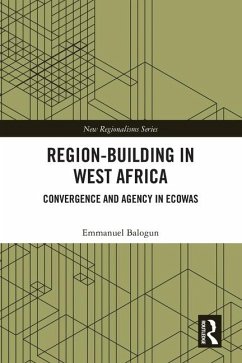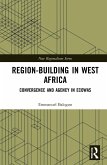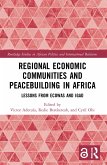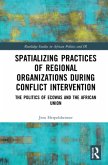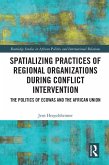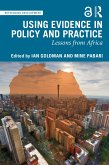This book examines the role of the Economic Community of West African States (ECOWAS) practitioners in coordinating, creating, and managing regional governance practices in the areas of public health, peace and security, and microfinancial integration.
Since 1975, there have been many failed and successful attempts at unconstitutional government changes in West Africa. During this same period, numerous instruments have been designed to promote peace and security in the region. This book examines the role of bureaucratic actors in the ECOWAS in harmonizing regional integration policy in West Africa. Using data from fieldwork in several countries in West Africa, Balogun observes how ECOWAS practitioners network and strategically engage regional stakeholders in health, peace and security, and finance as a means to deepen harmonization between ECOWAS Member States and build a connection with civil society. Balogun argues that the founding conditions of ECOWAS set the organization on an institutional path to adapt its approaches to regional governance.
Region-Building in West Africa challenges the idea that self-interested leaders limit regional cooperation. The book also challenges the idea that the bureaucrats in the organization are glorified servants to their governments. Region-Building in West Africa instead focuses on the influence that bureaucrats have in shaping the international policy agenda of ECOWAS.
This book will be useful to scholars, students, and practitioners in Africa and beyond who want to better understand the inner workings of African regional organizations, and the processes that drive cooperation across West Africa.
Since 1975, there have been many failed and successful attempts at unconstitutional government changes in West Africa. During this same period, numerous instruments have been designed to promote peace and security in the region. This book examines the role of bureaucratic actors in the ECOWAS in harmonizing regional integration policy in West Africa. Using data from fieldwork in several countries in West Africa, Balogun observes how ECOWAS practitioners network and strategically engage regional stakeholders in health, peace and security, and finance as a means to deepen harmonization between ECOWAS Member States and build a connection with civil society. Balogun argues that the founding conditions of ECOWAS set the organization on an institutional path to adapt its approaches to regional governance.
Region-Building in West Africa challenges the idea that self-interested leaders limit regional cooperation. The book also challenges the idea that the bureaucrats in the organization are glorified servants to their governments. Region-Building in West Africa instead focuses on the influence that bureaucrats have in shaping the international policy agenda of ECOWAS.
This book will be useful to scholars, students, and practitioners in Africa and beyond who want to better understand the inner workings of African regional organizations, and the processes that drive cooperation across West Africa.
"Dr. Balogun has written a very important book with an unambiguous argument: approaches to regional integration that attribute the survival of ECOWAS to the desire of self-interested heads of states and government who want to raise their formal status and maintain existing regimes, rather than serve public interests, are patently anachronistic. Instead, anyone looking for a systematic study of the people-centered region-building and integration role of international bureaucrats working with an inclusive cast of multiple stakeholders across scales of governance and how the said inclusivity enhances actor agency in Africa should read this book.
Dr. Balogun painstakingly weaves together the trials and tribulations of a regional integration organization that has from its inception to the present era of democratic regression in West Africa engaged in a convergence process to develop regional identity and community by bringing in multiple regional stakeholders, rather than just states and governments driven by realpolitik, into the regional governance space. This is a major contribution to the growing scholarship on private authority and regional governance in Africa, as well as a refreshing African voice in the new regionalism and comparative regionalism literature."
- Okechukwu Iheduru, School of Politics and Global Studies, Arizona State University
"A must read for scholars and practitioners alike, Balogun's novel application of practice theory, agential constructivism, and historical institutionalism provides a compelling analysis of the processes and implications of region-building in West Africa."
- J. Andrew Grant, Department of Political Studies, Queen's University, Canada
Dr. Balogun painstakingly weaves together the trials and tribulations of a regional integration organization that has from its inception to the present era of democratic regression in West Africa engaged in a convergence process to develop regional identity and community by bringing in multiple regional stakeholders, rather than just states and governments driven by realpolitik, into the regional governance space. This is a major contribution to the growing scholarship on private authority and regional governance in Africa, as well as a refreshing African voice in the new regionalism and comparative regionalism literature."
- Okechukwu Iheduru, School of Politics and Global Studies, Arizona State University
"A must read for scholars and practitioners alike, Balogun's novel application of practice theory, agential constructivism, and historical institutionalism provides a compelling analysis of the processes and implications of region-building in West Africa."
- J. Andrew Grant, Department of Political Studies, Queen's University, Canada

